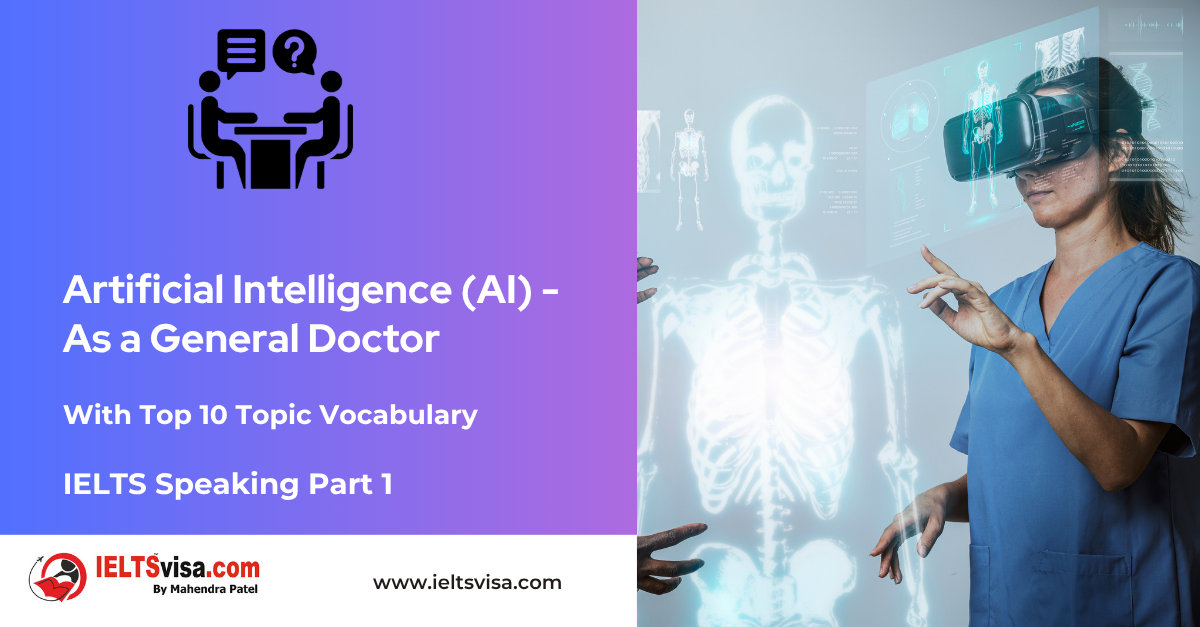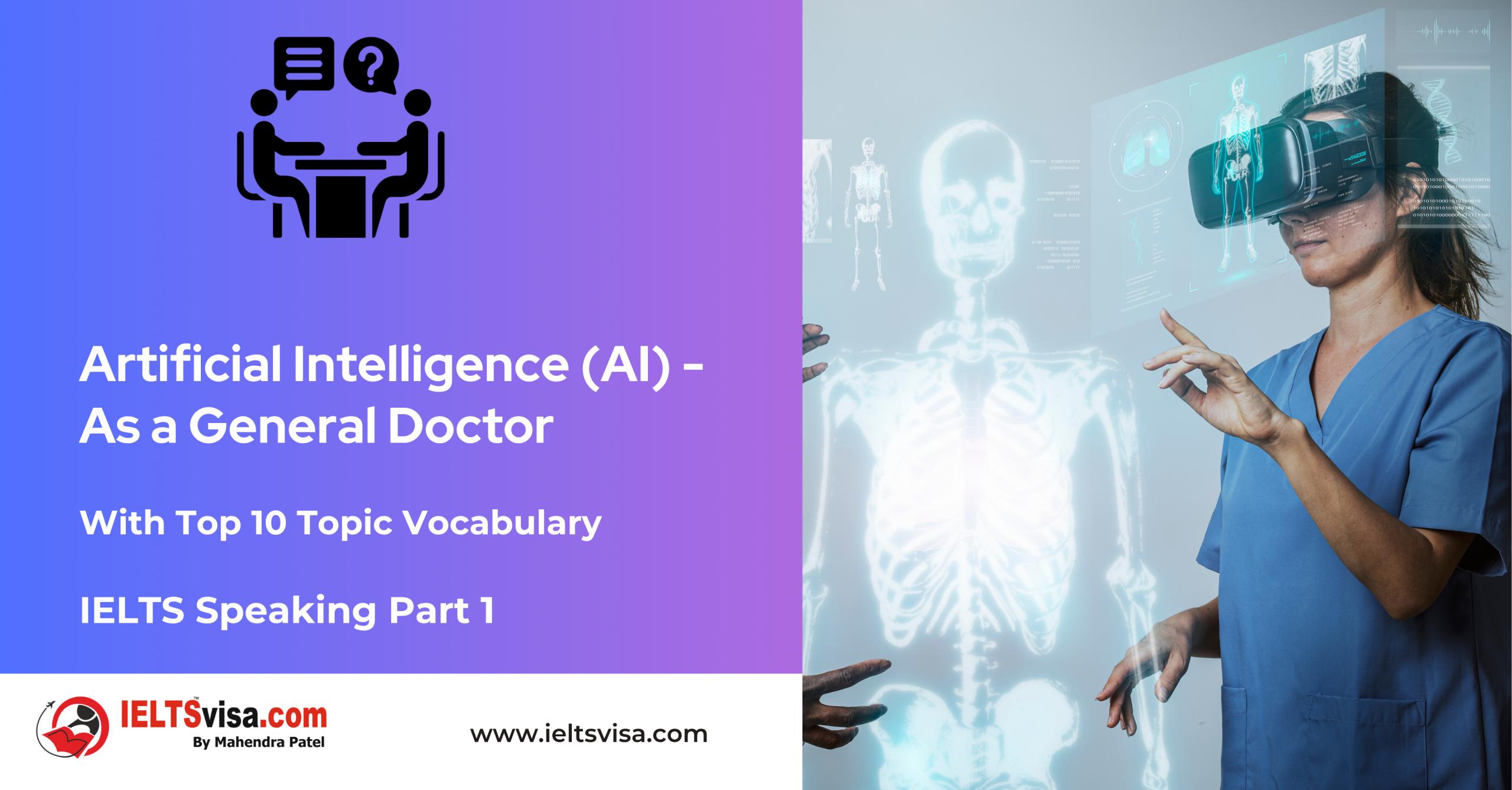IELTS Speaking Part 1 – Artificial Intelligence (AI) As a General Doctor
IELTS Speaking Practice
IELTS Speaking Part 1 – Artificial Intelligence (AI) As a General Doctor
Topic: Artificial Intelligence (AI)
Examiner: How has AI impacted your work as a doctor?
Candidate: AI has significantly impacted my work by enhancing diagnostic accuracy, streamlining administrative tasks, and providing personalized treatment plans based on vast amounts of data.
Examiner: Can you give an example of AI tools you use in your medical practice?
Candidate: I use AI-powered tools like diagnostic imaging software, which helps interpret X-rays and MRIs, and electronic health record systems that suggest potential diagnoses and treatment options based on patient data.
Examiner: Do you think AI can improve patient care?
Candidate:Absolutely. AI can analyze large datasets to identify patterns and suggest personalized treatments, which can lead to more accurate diagnoses and better patient outcomes.
Examiner: Are there any areas of medicine where AI is particularly useful?
Candidate: AI is particularly useful in radiology, pathology, and predictive analytics, where it can quickly analyze complex data and identify abnormalities that may be missed by the human eye.
Examiner: Do you think AI can help detect early diseases?
Candidate: Yes, AI can analyze data from various sources, such as medical records and genetic information, to identify early signs of diseases like cancer or diabetes, enabling earlier intervention and treatment.
Examiner: How do you stay updated on the latest advancements in AI in healthcare?
Candidate: I stay updated by reading medical journals, attending conferences, and participating in professional networks focused on AI and healthcare technology.
Examiner: What challenges do you face when integrating AI into your medical practice?
Candidate: Challenges include ensuring data privacy and security, addressing ethical concerns, and integrating AI tools with existing medical systems without disrupting workflows.
Examiner: Do you think AI will replace doctors in the future?
Candidate: I don’t believe AI will replace doctors. While it can assist with certain tasks, human doctors’ expertise, empathy, and decision-making skills are irreplaceable.
Examiner: How do patients generally react to AI-assisted medical care?
Candidate: Reactions vary. Some patients appreciate the increased accuracy and efficiency. In contrast, others may be concerned about privacy and the lack of a personal touch in their care.
Examiner: What role does AI play in medical research?
Candidate: AI plays a significant role in analyzing large datasets, identifying trends, and accelerating drug discovery processes. It helps researchers generate insights that might be difficult to uncover manually.
Examiner: Can you describe a situation where AI significantly impacted a patient’s treatment?
Candidate: AI-assisted imaging software once helped us identify a small, early-stage tumour that was not easily visible on a standard scan, allowing for early intervention and successful treatment for the patient.
Examiner: How do you ensure the ethical use of AI in your medical practice?
Candidate: I ensure ethical use by maintaining transparency with patients about AI’s role in their care, protecting patient data, and following guidelines and regulations set by medical authorities.
Examiner: What is your opinion on the potential of AI in personalized medicine?
Candidate: AI has great potential in personalized medicine by analyzing genetic, lifestyle, and environmental data to tailor treatments to individual patients, improving effectiveness and reducing side effects.
Examiner: How do you balance using AI with traditional medical practices?
Candidate: I balance AI use by employing it as a supportive tool for diagnostics and data analysis while relying on my clinical judgment and experience for patient interactions, treatment decisions, and overall care.
Top 10 Topic Vocabulary for “Artificial Intelligence (AI) As a General Doctor”
|
Vocabulary |
Type |
Meaning |
Synonyms |
Antonyms |
Word Family |
Example Sentences |
|
|
|
|
|
|
|
|
|
Diagnostic |
Adjective |
Relating to the identification of a disease or disorder |
diagnostic, diagnostic |
therapeutic, curative, remedial |
diagnosis |
The doctor performed a diagnostic test to confirm the patient’s condition. |
|
Streamline |
Verb |
Make more efficient or simpler |
simplify, rationalize, optimize |
complicate, make more complex, make more difficult |
streamlining |
The company streamlined its operations to reduce costs. |
|
Personalized |
Adjective |
Tailored to a specific individual or group |
customized, individualized, bespoke |
standardized, generic, common |
personalization |
The doctor provided a personalized treatment plan for the patient. |
|
Predictive analytics |
Noun |
The use of data, statistical algorithms, and machine learning to predict future outcomes |
forecasting, prediction, projection |
past, history, retrospect |
predictive |
Predictive analytics can help identify potential risks and opportunities. |
|
Ethical |
Adjective |
Relating to morality or the principles of right and wrong |
moral, virtuous, upright |
unethical, immoral, wrong |
ethics |
It is important to consider the ethical implications of new technologies. |
|
Transparency |
Noun |
The quality of being straightforward to understand |
openness, honesty, clarity |
secrecy, opacity, obscurity |
transparent |
The company has committed to greater transparency in its operations. |
|
Personalized medicine |
Noun |
A medical approach that treats patients based on their individual genetic makeup and other factors |
precision medicine, stratified medicine, targeted therapy |
traditional medicine, conventional medicine, standard care |
personalized |
Personalized medicine offers the potential for more effective and targeted treatments. |
|
Clinical judgment |
Noun |
The ability to make informed decisions based on medical knowledge and experience |
medical expertise, clinical expertise, medical judgment |
clinical inexperience, clinical naivety, clinical ignorance |
clinically |
The doctor’s clinical judgment was crucial in diagnosing the patient’s condition. |
|
Supportive tool |
Noun |
A tool or device that helps or assists |
aid, help, assistance |
hindrance, obstacle, impediment |
supportive |
The AI tool served as a supportive tool for the doctor’s diagnostic process. |
|
Tailored |
Adjective |
Made or adapted to suit a particular person or purpose |
customized, personalized, bespoke |
generic, standard, common |
tailor |
The doctor tailored the treatment plan to the patient’s specific needs. |

Our Books
Master IELTS Speaking Part 1
IELTS Writing Task 1 Book
IELTS Writing Task 2 Book
Practice IELTS Other Modules
IELTS Listening
The IELTS Listening test assesses how well you can understand spoken English in various contexts. It lasts about 30 minutes and is divided into four sections with a total of 40 questions. The listening tasks become increasingly difficult as the test progresses.
IELTS Academic Reading
The IELTS Academic Reading section assesses your ability to understand and interpret a variety of texts in academic settings. It is designed to evaluate a range of reading skills, including skimming for gist, reading for main ideas, reading for detail, understanding inferences, and recognizing a writer's opinions and arguments.
IELTS Speaking
The IELTS Speaking test assesses your ability to communicate in English on everyday topics. It lasts 11-14 minutes and consists of three parts: introduction, cue card, and a discussion based on the cue card topic.
IELTS General Reading
IELTS General Reading tests your ability to understand and interpret various types of texts. Here are some key areas and types of content you can expect to encounter in the reading section, along with tips for effective preparation.
IELTS Academic Writing Task 1
In IELTS Academic Writing Task 1, you are presented with a visual representation of information, such as graphs, charts, tables, or diagrams, and you are required to summarize, compare, or explain the data in your own words.
IELTS General Writing Task 1
In IELTS General Writing Task 1, you are required to write a letter based on a given situation. The letter can be formal, semi-formal, or informal, depending on the prompt. Here’s a breakdown of the key components to include in your letter
IELTS Academic Writing Task 2
In IELTS Academic Writing Task 2, you are required to write an essay in response to a question or topic. Here’s a guide to help you understand the essential elements of this task
IELTS Exam Tips
To succeed in the IELTS exam, practice regularly, familiarize yourself with the test format, improve your vocabulary, develop time management skills, and take mock tests to build confidence.
Grammer for IELTS
Grammar is the foundation of effective communication in English. Understanding tense usage, subject-verb agreement, and sentence structure enhances clarity and coherence in writing and speaking.
Vocabulary for IELTS
Vocabulary plays a crucial role in the IELTS (International English Language Testing System) exam, especially in the Speaking and Writing sections. Here’s an overview of why vocabulary is important and how it impacts your performance
RECENT IELTS SAMPLES QUESTIONS AND ANSWERS
IELTS Speaking Part 1 – Favourite Sujbect – Physics
IELTS Speaking Part 1 - Favourite Sujbect - Physics Q: What is your favourite subject? A: My favourite subject...
IELTS Speaking Part 1 – Present Situation (Student)
IELTS Speaking Part 1 - Present Situation (Student) Q1: Are you a student or do you work?A: I’m a full-time...
IELTS Speaking Part 1 – Present Situation – Employee – as an International Student and Social Worker
IELTS Speaking Part 1 - Present Situation - Employee - as an International Student and Social Worker Q1: Are...
IELTS Speaking Part 1 – Persent Situation – Employee- as an Electric Engineer
IELTS Speaking Part 1 - Persent Situation - Employee- as an Electric Engineer Q1: What do you do for a...
IELTS Speaking Part 1 – Persent Situation – Employee – as an Software Engineer
IELTS Speaking Part 1 - Persent Situation - Employee - as an Software Engineer Q1: What do you do for a...
IELTS Speaking Part 1 – Persent Situation – Married
IELTS Speaking Part 1 - Persent Situation - Married Q1: Are you married?A: Yes, I am married. My spouse and I...














